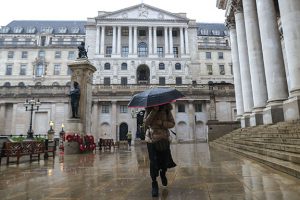Bloomberg
The Bank of England (BOE) has begun talks with the UK Debt Management Office and the Treasury over how to handle active sales of bonds held in its quantitative easing (QE) portfolio, according an official with knowledge of the matter.
The discussions come as the central bank last week said it would begin running down its 875 billion pounds ($1.2 trillion) of government bond holdings for the first time by letting expired gilts fall off its balance sheet, and reiterated it would consider active sales once
interest rates hit 1%.
Markets expect borrowing costs to hit that level in May, from 0.5% currently, putting pressure on officials to formulate a plan. The BOE declined to comment. The Treasury, of which the DMO is part, also
declined to comment.
The sales would mark a milestone for monetary policy after years of using QE to help stimulate the economy and stabilise financial markets.
But while the BOE’s intention to wind down its massive holdings has been well publicised, the speed at which the matter needs to be considered has likely come as a shock to officials. When they originally set out their plans last August, the threshold to begin active sales was not on course to be reached until at least 2026, according to market prices at the time.
Traders fear that the sales could disrupt the multi-billion pound gilt market, with Bank of America strategist Mark Capleton last week urging the central bank to “hand over†the process to the DMO, which manages the government’s debt issuance program.
The BOE previously promised to engage with the DMO over the process. In letters to the chancellor in June 2020 and on February 3 this year, Governor Andrew Bailey said that “the Bank would liaise with the DMO to minimise interference with the DMO’s own issuance program†when sales began.
While the 1% threshold is looming, it is unlikely that active sales will begin any time soon. Huw Pill, the central bank’s chief economist, this week dropped a hint that it would take its time over the matter, saying “1 percent is
not a trigger. It’s a point of
consideration.â€
“I think there is going to be an extensive consultation with the market before the Bank of England launches asset sales,†said Mohit Kumar, a managing director of interest rate strategy at Jefferies, who sees the central bank kicking off active quantitative tightening in 2023. “There is no hurry.â€
When the time for outright sales comes, the Bank of England may be reluctant to hand the active sales process over to an arm of the government
in case that compromises its
independence.
For now, even the passive rundown of the BOE’s balance sheet can prove a powerful tool. That alone is on course to wipe more than 200 billion pounds off its holdings by 2025, close to a quarter of the total pile.
 The Gulf Time Newspaper One of the finest business newspapers in the UAE brought to you by our professional writers and editors.
The Gulf Time Newspaper One of the finest business newspapers in the UAE brought to you by our professional writers and editors.
